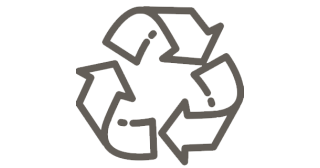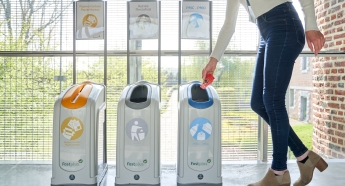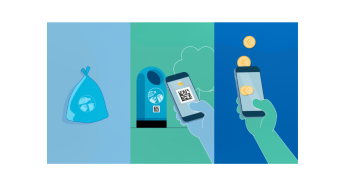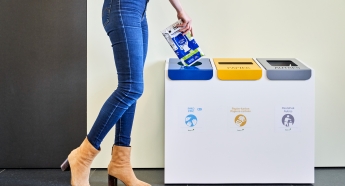Sorting the cultural and tourism sector
Sorting PMD is compulsory everywhere, including in the cultural and tourism sector: just think of amusement parks, zoos, cinemas, campsites, recreational areas or museums. But what’s the best way to go about it? How can you motivate employees and visitors? And how do you make sure that all waste is properly sorted? On this page, you will find the answers to all these questions and many more!
1. Analyse your situation
- What waste streams are generated? At what locations? In what quantities? Estimate the volumes for different zones.
- Are there any specific target groups (non-native speakers or children) who need an appropriate approach in terms of communication?
- Where will the waste be collected and which collection containers will be provided?
2. Choose the right rubbish bins and position them shrewdly
- Place rubbish bins at strategic locations: where visitors enter or leave the zone and wherever food and drinks are consumed. Match the size to the expected volume and avoid overflowing bins.
- Make sure all areas are covered: restaurants, cafeterias, food trucks, car parks, entrances and exits, etc. For each zone, determine what waste will be generated.
- Group bins for different materials into sorting islands: PMD and residual waste, and possibly organic waste in catering areas. Bear in mind that in visitor areas paper and cardboard are usually too contaminated and belong in residual waste.
- Provide a (central) collection point with large containers for each type of waste. Identify each collection container with a sticker. Give all staff clear instructions.
All you need to know about the choice and location of your rubbish bins
3. Bring in a professional waste partner
As a company or an organisation, you call upon a professional partner to collect and process your waste. You can add PMD to your current contract with your waste partner, but you can, of course, also opt for another waste partner.
Check whether your waste partner is affiliated to Fost Plus. That way, you can be sure that your PMD follows the proper path to recycling. These collectors can also provide you with the official PMD bags, bearing the words ‘PMD-Companies’. The official bags are also distributed by a number of cleaning companies.
Consult the list of affiliated PMD waste collectors
1. Inform
Visitors
Clearly indicate that visitors have to sort their waste and explain exactly how to do that. Integrate your waste and sorting policy into the overall communication and promotion of your event. Involve visitors as much as possible and state that everyone is responsible for a clean event.
Place the various bins together in sorting islands and make sure they bear the necessary stickers and wording. You can order free stickers from The Sortstore.
Discover the full range at www.thesortstore.be
Employees
Involve all staff in sorting and provide training for employees, volunteers, waste managers and cleaning teams on both sorting rules and the importance of quality.
Pay adequate attention to kitchens, bars and other catering facilities, as well. A lot of packaging is generated there too. Make sure that all employees know the PMD sorting rules for the hospitality industry and that they put the various waste streams in the appropriate collection containers provided by your waste partner. It is also important that they use the correct bags.
What about catering packaging?
In food preparation areas specific catering packaging is generated in addition to PMD. Examples include bulk packaging of sauces, spices or drinks, single-use gas cylinders and plastic films. But which packaging can you put in PMD, and what does not belong there?
What about the packaging used for medical material?
In certain environments, including zoos, a lot of packaging is also generated from medical equipment and personal care products. Some of that packaging is allowed in PMD, but certainly not all of it!
2. Monitor
Monitor the results
Once you have started, it is important to monitor the sorting quality of the waste streams closely. Analyse the quality of the streams collected and take note of the most frequent problems. Regularly check how full the bins are and make adjustments where necessary. Involve all staff and take their remarks into account, as well.
Make good arrangements with your waste partner to obtain the information you need and analyse their reports and invoices. Monitor the quantities of each waste stream collected via the invoice or by making your own estimate of the number of bags or containers.
Motivate and give feedback
Communicate the results to visitors and staff. Tell them how much is sorted and how the quality is developing. This way, you will motivate everyone who sorts properly and bring the final doubters on board. Don’t forget to thank everyone for their efforts!
Tell them about the positive points but draw attention to the areas that need improving and any sorting errors, as well. For example, bottles and cans need to be empty if they are to be given a new life. And don’t forget: a lot more can be put in the blue bag than before! Including yoghurt pots and plastic trays.
1. A sustainable and logical choice
Sorting PMD is a sustainable choice! Because the more we sort, the more we can recycle. That way, we make sure that packaging is no longer lost in the residual waste but is given a new life as a valuable raw material. But it's also totally logical. Because we all do it at home. Visitors therefore increasingly expect to be able to sort their PMD – and other types of waste – properly.
2. Sorting, a legal obligation
As a company or organisation, you are obliged by law to sort your PMD. Incidentally, the same applies to many other waste flows, too, such as glass, paper-cardboard and recently, kitchen waste and left-over food. The competent services are carrying out more and more inspections – and the law sets severe penalties for infringements.
Full details of your legal obligations can be found here
3. Start now and receive a welcome bonus!
Did you know that as a company or organisation, you can receive a welcome bonus of 75 euros if you start sorting PMD now? So there’s no time to lose!









